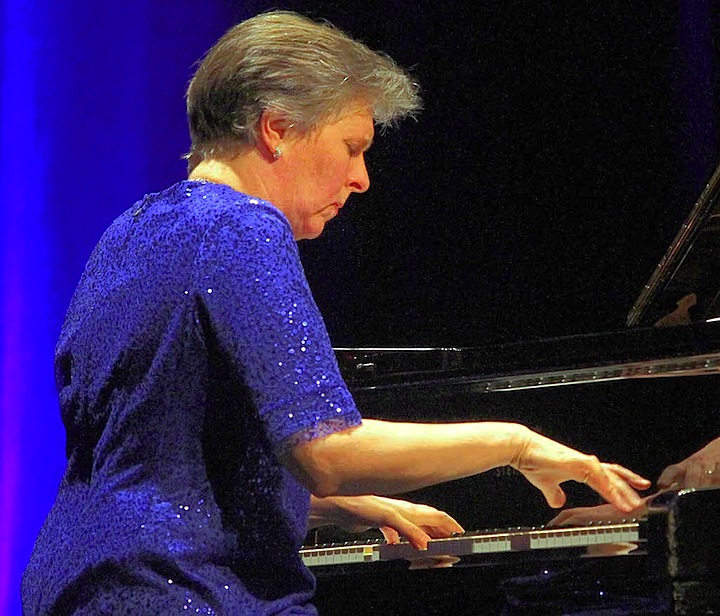
Expat Montrealer Janina Fialkowska is planting a Canadian maple at her new home in Bavaria this fall. In Toronto this week, she is planting a musical seedling — the 1988 Piano Concerto by late Polish composer Witold Lutoslawski — that she hopes will take root as well.
With even minimal care, the maple’s chances of survival are very good. The Piano Concerto‘s fate is not so easy to predict.
Fialkowska was at the North American début of the work, performed by the New York Philharmonic and pianist Krystian Zimerman, in 1989. “I was blown away by it and said, I have to play this piece,” she recalls.
She has waited patiently all these years for someone to ask her to play it in public.
Thanks to Toronto Symphony Orchestra music director Peter Oundjian being a neighbour in Connecticut, Fialkowska’s home base until recently, Torontonians are getting to share in this momentous moment. They were at a dinner together about a year ago, when Fialkowska brought up the topic of piano concertos she would like to play but doesn’t get a chance to.
This year being the 100th anniversary of Lutoskawski’s birth, Oundjian decided that the Toronto Symphony would celebrate with Fialkowska’s performance.
It’s ironic that Oundjian isn’t in Toronto this week; this week’s concerts — on Thursday afternoon and Saturday evening — are being led by young American hotshot James Gaffigan. Also on the programme are Antonin Dovák’s Carnival Overture and the Symphony No. 2 by Johannes Brahms. (The programmes vary by day — including tonight’s Afterworks concert at 6:30 p.m., which doesn’t include the concerto.)
The pianist has built her international reputation with the Romantics — the music of Frédéric Chopin and Franz Liszt in particular. So it may seem strange that Fialkowska has chosen a piece from the late 20th century to make a splash at Roy Thomson Hall. But this very modern concerto has a lot in common with the great crowd-pleasers of the 19th century.
“This is one of the great concertos of the second half of the 20th century,” she insists. The four-movement piece, meant to last about 27 minutes, has the shape or silhouette of a great Romantic concerto, with great, big virtuosic passages interspersed with more introspective moments — “and moments of great Romantic lyricism,” the pianist adds.
Fialkowska says her main attraction is to Lutoskawski’s meticulous sense of order. “He is a logical composer, like Chopin, and I am drawn to logic.”
“That’s why I have so much fun with this piece,” she continues. “I know what he is trying to do at every moment; I don’t question it.”
The pianist explains that composers who don’t play the instrument themselves often can’t call on the full range of skills she can bring to the keyboard. Lutoskawski, who started off his adult life as a concert pianist, knows the instrument intimately, forcing his soloist to use all the technical and expressive means at their disposal.
“This is technically interesting for me as a pianist,” says Fialkowska, who has spent all of the last three months preparing the concerto for Thursday’s first performance.
Many people wonder why the art music world spends so much time celebrating anniversaries. Mozart’s birth or death are immaterial, because we would hear and play and love his work anyway. But if it weren’t for Lutoslawski’s 100th birthday (which fell on Jan. 25), Fialkowska would still be waiting for a chance to sink her fingers into an exciting, still-new piece.
The pianist says the list of concertos she is asked to play has been shrinking steadily since she began her professional career a generation ago. What was once a repertoire list of 50 to 60 pieces is now down to half that, and she admits she could easily get by with a half-dozen concertos for the rest of her performing life.
Fialkowska calls this a “lack of imagination” on the part of symphony programmers. Symphony marketers insist they need big names to sell tickets. The resulting tension and debate could fill a very thick book. But the important thing in Toronto, this week, is that we’re being given an opportunity to savour something new that comes with the enthusiastic support of a pianist whose taste is beyond question.
In his programme notes for the concerto (available here), Lutoskawski concludes in a philosophic frame of mind: “All that has been said applied to matters which are not of great importance compared to the central essence which the composer employs to achieve his goal. What then is this goal? To this question only music itself can provide the answer. Happily, it cannot be explained in words. If it were possible, if a musical work could be described precisely in words, then music as an art would be entirely unnecessary.”
So let’s let the music speak.
(Even so, the young maple tree in Fialkowska’s future front yard still enjoys the better odds for growing in stature.)
+++
You’ll find all the details of Thursday and Saturday’s concerts here — and tonight’s Afterworks concert here.
John Terauds